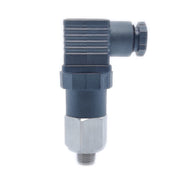News
What is an intelligent temperature transmitter module? Its advantages and application scenarios
An intelligent temperature transmitter module is a device used to measure temperature and convert the temperature reading into a standardized electrical signal that can be used by other devices, such as programmable logic controllers (PLCs), distributed control systems (DCS), or other control equipment. These modules can also be equipped with additional features, such as digital communication protocols, advanced diagnostics, and self-calibration capabilities, making them a more sophisticated and versatile option for temperature measurement and control.
Advantages:
- Improved accuracy and reliability: Intelligent temperature transmitter modules are often equipped with advanced sensing technologies, such as resistance temperature detectors (RTDs) or thermocouples, which offer improved accuracy and reliability compared to traditional thermometers.
- Better integration: These modules are designed to be easily integrated into a control system, reducing the amount of wiring required and simplifying the installation process.
- Advanced diagnostics: The modules can provide valuable diagnostic information, such as sensor health, drift, and other performance metrics. This allows for better maintenance and troubleshooting of the system, improving its overall reliability and uptime.
- Self-calibration: Some intelligent temperature transmitter modules are designed to automatically self-calibrate, reducing the need for manual calibration and reducing the likelihood of measurement errors.
Application scenarios: Intelligent temperature transmitter modules can be used in a wide range of industries and applications, including:
- Chemical and petrochemical processing: To measure temperature in reactors, heat exchangers, and other critical process equipment.
- Food and beverage processing: To monitor temperature during the production of food and beverages, ensuring that the correct temperature is maintained for food safety and quality.
- HVAC systems: To measure and control temperature in heating, ventilation, and air conditioning systems.
- Pharmaceuticals: To monitor and control temperature in pharmaceutical manufacturing processes, where strict temperature control is critical.
- Energy management: To monitor and control temperature in power plants, refineries, and other energy-related facilities, helping to optimize energy consumption and reduce costs.
Overall, the use of intelligent temperature transmitter modules can provide improved accuracy, reliability, and diagnostic capabilities in temperature measurement and control applications, making them a valuable tool for a wide range of industries and applications.



Leave a comment